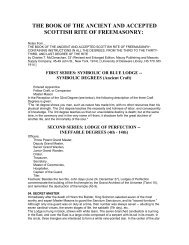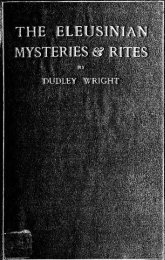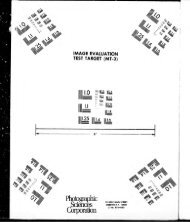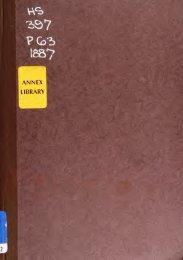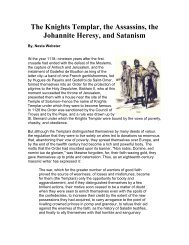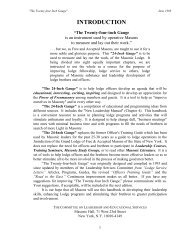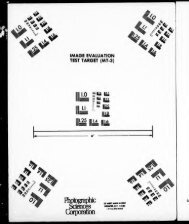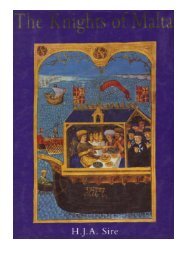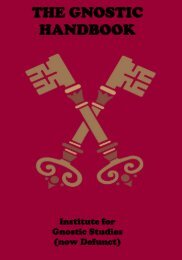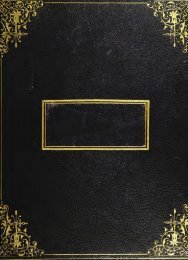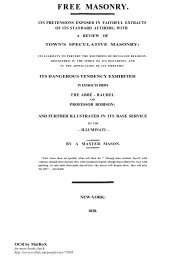Scottish Rite Masonry Illustrated - The Masonic Trowel
Scottish Rite Masonry Illustrated - The Masonic Trowel
Scottish Rite Masonry Illustrated - The Masonic Trowel
Create successful ePaper yourself
Turn your PDF publications into a flip-book with our unique Google optimized e-Paper software.
854 GRAND INSPECTOR INQUT5TTOR COMMANDER.<br />
of juslice; the law of right, by experience and observation,<br />
but that God has given us a moral faculty, our<br />
conscience, which is able to perceive this law directly<br />
and immediately, by intuitive perception of it. And it is<br />
true that mant has, in his nature, a rule of conduct<br />
higher than he has ever yet come up to; an ideal of nature<br />
that shames his actual history, because man has<br />
ever been prone to make necessity; his own necessity,<br />
the necessities of society, a plea for injustice. But this<br />
notion must not be pushed too far. For if we substitute<br />
this ideality for actuality, then it i 5 equally true,<br />
that we have within us an ideal rule of right and wrong,<br />
to which God himself, in his government of the world,<br />
has never come and against which he (we say it revenentially)<br />
every day offends. We detest the tiger and the<br />
wolf, for their rapacity and love of blood, which are<br />
their nature.<br />
We revcilt against the law, by which the crooked<br />
limbs and diseased organism of the child, are the fruits<br />
of the father’s vices. We even think that a God, omnipotent<br />
and omniscient, ought to have permitted no pain,<br />
no poverty, no servitude. Our ideal of justice is snore<br />
lofty than the actuahitie~ of God. It is wehl as all else<br />
is wehh.<br />
He has given us that moral sense, for wise and benificent<br />
purposes. We accept it, as a significant proof of<br />
the inherent loftiness of human nature, that it can ascertain<br />
an ideal so exalted, and we should strive to attain<br />
it, so far as we can do so consistently with the relations<br />
which he has created, and the circumstances which surround<br />
us and hold us captive.<br />
If we faithfully use this faculty of conscience; if applying<br />
it to the existing relations and circumstances we<br />
develop it and all its kindred powers, and deduce the<br />
duties that out of these relations and those circum-<br />
INITIATION. 355<br />
stances, limited and qualified by them, arise and become<br />
obligalory upon us, then we learn justice; the law of<br />
right; the divine rule of conduct for human life. But<br />
if we undertake to define and settle the mode of action,<br />
that belongs to the indefinitely perfect nature of God<br />
and to set up an ideal rule beyond all humaui reach, we<br />
soon come to judge and condemn his work, and relations<br />
which it has pleased him in his infinite wisdom to create.<br />
A sense of justice belongs to human nature and is a<br />
part of it. Man can find a deep, permanent and instinctive<br />
delight in justice, not only in the outward effects,<br />
but in the inward cause, and by his nature love this law<br />
of right; this reasonable rule of conduct, this justice,<br />
‘with a deep and abiding love. Justice is the object of<br />
conscience, and fits it as light fits the eye and truth the<br />
mind. Justice keeps just relations between men. It<br />
holds the balance between nation and nation; between<br />
a man and his family, Iribe, nation and race; so that<br />
his absolute rights and theirs do not interfere, nor their<br />
ultimate interests ever clash, nor the internal interests<br />
of Ihe one prove antagonistic to those of all, or of any<br />
other one. This we must believe, if we believe that God<br />
is just. We must do justice to all, and demand of all.<br />
It is a univeysal human debt; a universal human claim.<br />
But we may err greatly in defining what that justice is.<br />
<strong>The</strong> temporary interests, and what to human views are<br />
the rights of many, do often interfere and clash. <strong>The</strong><br />
life interests of the individual, often conflict with the<br />
permanent interests and welfare of society; and what<br />
may seem to be the natural rights of one class or race,<br />
with those of another.<br />
It is not true to say that one man, however little, must<br />
not be sacrificed to another, however great; to a majority,<br />
or to all men. That is not only a fallacy, but a moat



